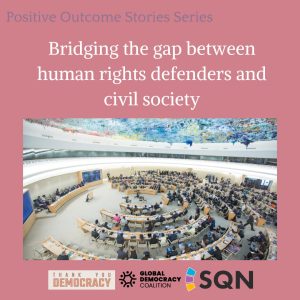Sine Qua Non (SQN) Positive Outcome Story: Bridging the gap between human rights defenders and civil society

There is an ever-growing need to bridge the gap between human rights defenders and civil society, on the one hand, and international organisations such as the United Nations, the Council of Europe and the European Union, which share the same objectives, on the other. This objective is based on the idea that it is necessary to provide activists and civil society with tools that will be useful in their struggle for a better society. The ability to relate to these institutions would be one of these indispensable tools.
Sine Qua Non focuses on building the capacity of organisations working on the ground. It is therefore crucial to explain how these institutions work so that civil society can relate to them and use the leverage they provide to improve democracy and the rule of law, and to seek accountability for human rights violations. It shares the knowledge of how these international mechanisms work with civil society, enabling them to approach and engage with these institutions and bring their reality closer to the global stage. In this regard, SQN noticed that there was a lack of knowledge about the possibilities for civil society to interact with and report to these organisations. For example, during the third cycle of the Universal Periodic Review (UPR), it was evident that many grassroots organisations were unaware of the existence of the mechanism. As a result, it was decided to implement a project to build the capacity of organisations willing to improve the situation in their countries by participating in the UPR and monitoring its outcomes. In 2023 specific guides on the SQN website were published explaining how the mechanism works and the opportunities for advocacy throughout the cycle, as well as on how to start preparing shadow reports. SQN started holding information sessions for activists who want to learn more about the objectives of the UPR and the technical issues involved in reports. When organisations decide to write a report, SQN accompany them throughout the process, guiding them in the preparation of the report and, once submitted, monitoring its status throughout the cycle. More than twenty organisations have already benefited from this project.
The above is very positive for civil society since they acquire direct access to the main human rights institutions, as it not only provides them with tools to help them in their struggle, but also broadens the institutions’ perspective on their situation. By being empowered to use this knowledge and connections to strengthen democracy in their countries, activists facilitate the initiation of change in the countries concerned, and by informing institutions about their contexts and situations, they also help institutions to increase their positive influence around the world and improve the overall level of democratic values.
